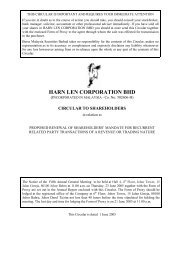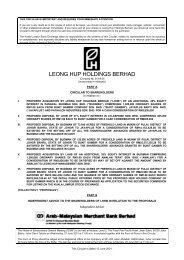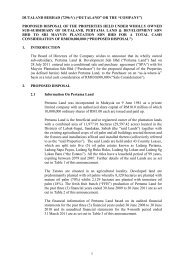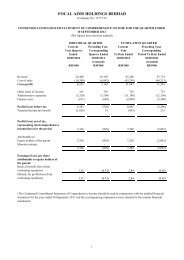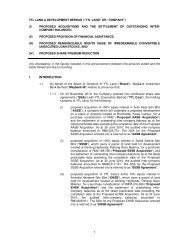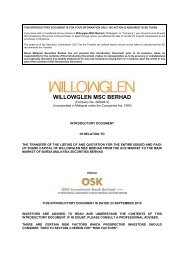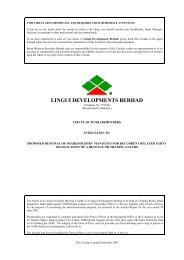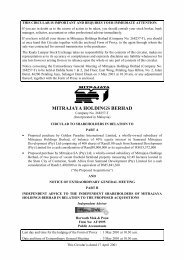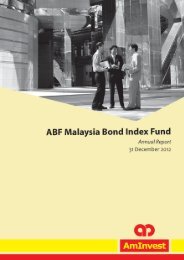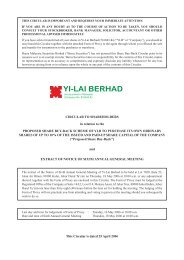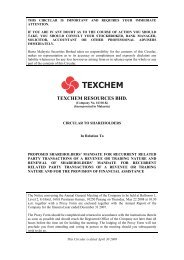WTK Holdings Berhad - Bursa Malaysia
WTK Holdings Berhad - Bursa Malaysia
WTK Holdings Berhad - Bursa Malaysia
You also want an ePaper? Increase the reach of your titles
YUMPU automatically turns print PDFs into web optimized ePapers that Google loves.
22<br />
Chairman’s Statement<br />
Dear Shareholders,<br />
On behalf of the Board of<br />
Directors, I am pleased to<br />
present the Annual Report<br />
and Audited Financial<br />
Statements of the Group<br />
for the financial year ended<br />
31 December, 2003.<br />
FINANCIAL PERFORMANCE<br />
Riding upon the gradual improvement in global timber prices particularly<br />
towards the second half of 2003, the Group achieved a higher turnover<br />
and profitability for the year. The Group’s turnover rose 12.4% to RM557<br />
million and profit after tax improved 4.3% to reach RM44 million as<br />
compared with FY2002. Consequently, the Group’s earnings per share<br />
(EPS) improved 5.8% to approximately 30 sen.<br />
REVIEW OF OPERATIONS<br />
Timber<br />
Generally for 2003, the tropical timber industry saw a gradual recovery in timber<br />
prices and demand towards the second half of the year. It became apparent<br />
then that the Indonesian Government intensified its level of enforcement to<br />
curb illegal logging and over-production to meet sustainable forestry targets.<br />
This effort gave rise to a supply crunch as Indonesia is a major producer of<br />
tropical timber, contributing about 20% of the world’s supply. On the demand<br />
side, the improving economic outlook in Japan and strong growth in China<br />
and India also led to a rise in demand for timber, reinforcing the positive impact<br />
on timber prices.<br />
For the Group, the year started on a grim note owing to a flat outlook in the<br />
Japanese housing starts, a traditional indicator of the industry’s direction for<br />
the year and also its price leader. However, the continued strong demand for<br />
timber products from alternative markets like China and India and in the second<br />
half, an improved Japanese economy saw a pickup in housing starts and rising<br />
business sentiment and confidence led to timber prices firming up gradually.<br />
Additionally, on the demand side, Japan also reinforced a new standard on its<br />
existing JAS, raising the bar on allowable formaldehyde emission level in<br />
plywood in July 2003. This negatively affected producers that were not yet<br />
JAS-complied and benefited those whom have complied earlier. The revised<br />
JAS requirement effectively narrowed the supply of plywood for the medium<br />
term and as was expected, plywood prices firmed up.<br />
W T K HOLDINGS BERHAD (10141-M)



